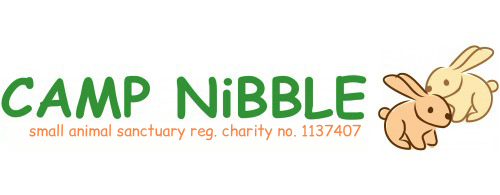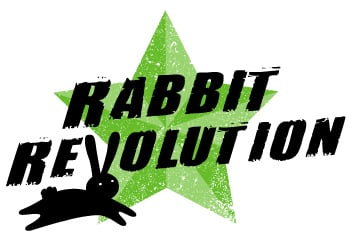Nibble News
Exposed - Factory farming's best kept secret.
(November 10, 2012)Rabbit Battery Farming
The following text and video is from the Compassion in world farming (CIWF) website:
Exposed: factory farming’s best kept secret
During a recent investigation, our team visited rabbit farms in France, Spain and Italy - where more than three quarters of all rabbit farming in the EU takes place. Appalling suffering was documented; rabbits kept in tiny, bare wire cages, unable to move freely or express their natural desires to dig or hide. Rabbit faeces were built up under the cages – piled up to knee-height in places. And there were bins – full of dead rabbits.
Watch the ground breaking footage here. Please be aware it contains scenes of a distressing nature.
We must stop the suffering Compassion believes that if rabbits are to be farmed then we have a responsibility to ensure that they are kept in humane farming systems. All farm animals should be allowed to live a life free from pain and mental distress, and be able to express their natural behaviours.
Keeping thousands of rabbits in small, barren cages is completely unacceptable and we must stop the suffering. We banned the barren battery cage for hens and now we must do the same for rabbits.
Rabbit meat available in the UK, not labelled from a higher welfare system, is almost certainly inhumanely farmed. Please tell your friends not to buy it and help us spread awareness by sharing our film with your friends.
Help CIWF start the Rabbit Revolution today.
For full information of their amazing work and to donate to Compassion in World Farming please visit their website:
Read on for more info: Rabbits are the fourth most farmed animal in the world and most are kept in barren environments, often in cages. In the EU the majority are housed in sheds containing 500 to 1000 breeding females (does) and 10,000 to 20,000 growing rabbits. The domesticated rabbit has kept most of their wild rabbit’s natural behaviour and intensive farming systems have severe negative implications for welfare.
Currently there is no species-specific legislation protecting the welfare of farmed rabbits in the EU. A few countries within the EU have species specific requirements for rabbit farming but they produce only a very small percentage of rabbit meat farmed in the EU.
Inadequate space and height
Rabbits are cramped together in barren cages, with no ability to stretch, hop or sit up right. Young rabbits reared for meat (growers) in the EU are typically caged in groups with 450 to 600cm² space each; this is less than the area of an ordinary A4 sheet of typing paper. The functional space available to growing rabbits housed in small groups in cages is insufficient to allow many normal activities, such as sequences of hops, running and play behaviour.
A typical cage for an adult doe in the EU is 60 to 65cm long, 40 to 48cm wide and 30 to 35cm high. This means that rabbits cannot move normally or adopt normal postures such as stretching out, sitting and standing with their ears erect (species typical “look out” posture), rearing up, turning around comfortably and hopping. Lack of exercise can also lead to weakened bones.
Barren environment Rabbits are reared in a barren environment except for a drinker and feeder and are fed on pellets. The barren environment does not allow natural behaviours such as: digging, hiding and foraging which leads to abnormal behaviours such as over grooming and repetitive gnawing or nibbling of the cage. Females that are reared for breeding and not nursing may also suffer from hunger as they are often kept on a restricted diet.
Lack of social interaction
Rabbits end up over grooming themselves due to boredom- this is known as stereotypical behaviour. Rabbits are social animals living in stable groups. Serious aggression is rare once a stable hierarchy has been established.
Growers are often housed in pairs or groups, but breeding does and bucks are usually kept in individual cages, denying them the opportunity for social interaction. Rabbits caged singly may show more abnormal stereotypical behaviour such as over grooming and gnawing at the bars of their cage. Research has demonstrated that breeding rabbits can be housed successfully in groups if they are given sufficient space and adequate nesting facilities to avoid possible aggression problems.
Injuries and disease The cages are made of wire and sometimes have metal sheet sides. Often the floor is entirely bare wire. Breeding male and females kept on bare wire often develop sores on their footpads and hocks. The sores can cause chronic pain and are a common reason for culling. By having a plastic platform or slatted footrest ulcerative lesions on the hock can be prevented and can help cure those affected.
Does are commonly given hormone treatment to get them ready to breed at the same time and then are artificially inseminated on average within 11 days after giving birth. Their bodies are put under huge strain from the constant reproduction cycle and this can lead to loss of body condition and metabolic disease.
Fattening rabbits in a barren cage. They will typically be slaughtered at 10-12 weeks old. Mortality of commercially farmed rabbits is very high, with commonly 100 - 120% of breeding does dying or being culled and replaced each year and losses of 15 to 30% of growers from birth to slaughter. Respiratory and intestinal diseases are the main reason for such high mortalities and cause acute pain. Rabbits are so susceptible to disease when kept in intensive conditions that in France in 2010 rabbit farming used over 7 times more antibiotics per kilogram of meat compared to poultry and over 5 times more than used in pig meat.
Slaughter In the EU commercially slaughtered rabbits are usually electrically stunned before slaughter. Research has shown that rabbits may be frequently incorrectly stunned. Rabbits are hung individually upside down for the electrical stunning which is stressful and may cause pain and/or injury if their weight is not supported properly. This is a particular problem for larger rabbits.
For full information of their amazing work and to donate to Compassion in World Farming please visit their website:

